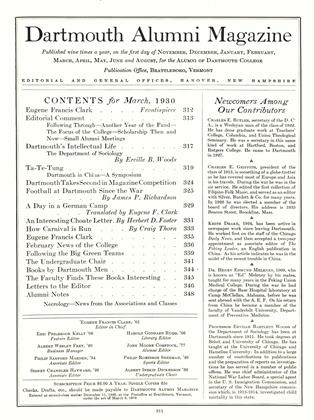The late Professor Herbert D. Foster left a number of-payers with the Editor of the ALUMNI MAGAZINE. We shall publish them all in the coming months.
EIGHT letters from Rufus Choate's wife, Helen Olcott Choate, and their favorite daughter of the same name, leave one with a glimpse of the charm of Choate's Boston home of 1835-1843.
Helen Choate, wooed and won in Choate's college days, not only recognized his "strength of mind," but was a help in his correspondence, writing in his behalf legible letters to his mother, brother, and sister (thereby saving both him and them time), sometimes passing on legal advice, but always something of the gentle affection of the home she made so happy. Helen was as winning a daughter-in-law as she was wife and mother.
One catches pictures of Rufus and Helen riding together, with four-year-old "Ruffle," to revisit the old home in "endeared Hanover" (perhaps at the time Helen cut her name on the pane of glass still remaining in the venerable Ripley-Olcott-Leeds House, next the White Church on the Green)* or returning in a chaise from the apple blossoms of the Old Choate home in Essex to the peach tree which bloomed in Choate's Boston garden. The thoughtful daughter-in-law writes the homely news so satisfying to the heart of the old mother and grandmother about Rufus' going and coming, his "Tansy bitters," diet and health, the children's joys in vacations, her own wholesome interest in the "comforts of life" of which she was herself evidently one to others. The eight letters, two of which are printed here, reveal a wife and mother of gentle, kindly humor, deep, well-poised affection, a teller of stories to children whose merry voices, far from annoying the letter-writer, ring through them to the grandmother in Essex.
The Caroline referred to in the letter of 1838 was the daughter for whom Choate manifested the touching affection described in Brown's Life of Choate (62-64).
"Ruffle" was the son to whom Choate expressed the love of a man for both his own son and his own spiritual mother in a sentence that might well become a classic to fathers and sons of Dartmouth. "My college life was so exquisitely happy that I should like to relive it in my son."
The unconscious testimony of the letter of Rufus, his wife and their young daughter Helen, all alike confirm the traditional picture of the charm of the home life and of the wife continuing from the romance of courtship and marriage in the old Olcott Mansion in the college town, to the no less happy home which Helen made for the sensitive, high-strung, happy scholar whose home life contributed so much to his successful public career.
Boston, Sept. 17th, 1836.
To: Mrs. Miriam Choate, Essex, Mass.
My dear Mother,
We reached home very safely about one o'clock after a very pleasant ride—everything looked natural and as we left it—but I feel the want of your pleasant circle at Essex more than I can express for I have been almost entirely alone excepting a caller or two. The children sit down with me and imagine what you are all about and enjoy the remembrances highly. Rufus has begun on his Tansy bitters, made according to Mrs. Farrar's prescription and is eating for breakfast rye pudding and milk, but I don't believe he will like it long.
I think you would have been amused at an exhibition of Ipswich girls which we had on our way home—there were four stages of girls—filled inside and out—and they attracted not a little attention from the bachelors in Salem. The Coffee House was surrounded.
I am writing in the midst of a terrible noise for my girls have company and their chattering is immense.
I suppose you are glad to see this rain. It looks rather dismal to me. I have not been out since my return. Lucy is well off and she gained 3 pounds during her exile. She says she enjoyed herself very much. Rufus' forehead looks just as it did when he left—tho' not swollen quite so much.
Miriam is not very well—but is as good as ever. Sarah's face looks quite natural.
Mrs. Brown's school commences the first of Oct. She charges 9 dollars in the winter and 8 in the summer. It's too much I think. I hope you will let me hear from you soon—it will give me much pleasure. Give our love to all over and over—and now my dear mother good bye and believe
Your very affectionate Daughter.
Rufus and the children send a great deal of love don't let little Rufus forget my stories.
(To be continued)
The Choate house has since been moved.
 View Full Issue
View Full Issue
More From This Issue
-
 Class Notes
Class NotesCLASS OF 1909
March 1930 By Robert J. Holmes -
 Class Notes
Class NotesCLASS OF 1923
March 1930 By Truman T. Metzel -
 Article
ArticleTa-Te-Tung
March 1930 By Charles E. Butler -
 Lettter from the Editor
Lettter from the EditorEditorial Comment
March 1930 -
 Sports
SportsFootball at Dartmouth Since the War
March 1930 By James P. Richardson -
 Article
ArticleHow Carnival is Run
March 1930 By Craig Thorn
Herbert D. Foster
-
 Class Notes
Class NotesCLASS OF 1885
APRIL 1906 By Herbert D. Foster -
 Class Notes
Class NotesCLASS OF 1885
October, 1909 By Herbert D. Foster -
 Class Notes
Class NotesCLASS OF 1885
December, 1910 By Herbert D. Foster -
 Class Notes
Class NotesCLASS OF 1885
April, 1911 By Herbert D. Foster -
 Class Notes
Class NotesCLASS OF 1885
December, 1911 By Herbert D. Foster -
 Class Notes
Class NotesCLASS OF 1885
April, 1914 By Herbert D. Foster







